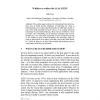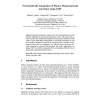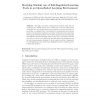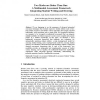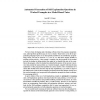AIED
2015
Springer
8 years 11 months ago
2015
Springer
AIED
2015
Springer
8 years 11 months ago
2015
Springer
Despite the popularity of games, there has been limited peerreviewed literature published on game-based learning for science. This paper will describe a project that combined an In...
AIED
2015
Springer
8 years 11 months ago
2015
Springer
Better conversational alignment can lead to shared understanding, changed beliefs, and increased rapport. We investigate the relationship in peer tutoring of convergence, interpers...
AIED
2015
Springer
8 years 11 months ago
2015
Springer
AIED
2015
Springer
8 years 11 months ago
2015
Springer
This paper proposes an approach for creating and testing an multiagent systems based adaptive social educational game (SEG), QuizMASter, using the concept of simulated learners to ...
AIED
2015
Springer
8 years 11 months ago
2015
Springer
We present AttentiveLearner, an intelligent mobile learning system optimized for consuming lecture videos in both Massive Open Online Courses (MOOCs) and flipped classrooms. Attent...
AIED
2015
Springer
8 years 11 months ago
2015
Springer
This paper discusses a design-based research study that we conducted in a middle school science classroom to test the effectiveness of SimSelf, an open-ended learning environment ...
AIED
2015
Springer
8 years 11 months ago
2015
Springer
We are beginning to see the emergence of advanced automated assessment techniques that evaluate expressive student artifacts such as freeform written responses and sketches. These ...
AIED
2015
Springer
8 years 11 months ago
2015
Springer
Abstract. Recent years have witnessed major research advances in sensorbased affect recognition. Alongside these advances, there are many open questions about how effectively curre...
AIED
2015
Springer
8 years 11 months ago
2015
Springer
A framework is proposed for automated generation of self-explanation questions in worked examples. In the framework, in addition to the questions, the correct answer, distracters a...
